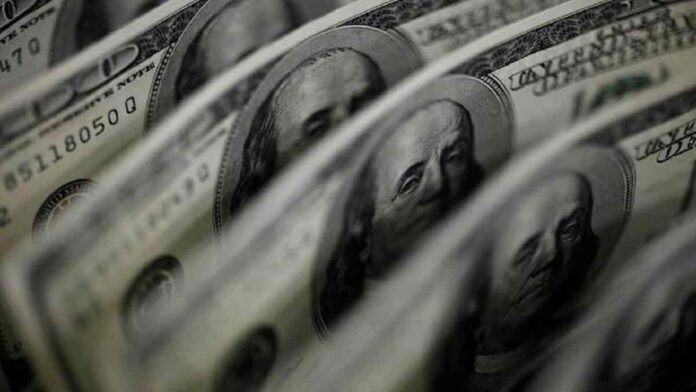Naira Depreciates as FX Reserves, Dollar Inflows Fall
The Nigerian local currency, Naira, faces a bleak future as foreign reserves fall rapidly while foreign currencies or dollar inflows into the domestic economy have been negatively impacted, according to data from the monetary policy authorities.
Naira was sold at N419.75 at the official window on Friday. Though, demand pressures in the parallel market slowdown, the local currency was exchanged for a dollar at N606 as of Friday, from N610 in the previous week.
Data from the Central Bank of Nigeria shows that external reserves decline further in the just concluded week, trending behind the $40 billion mark despite higher global prices of crude oil.
The oil windfall eludes Africa’s largest economy due to low investment in oil infrastructure and theft – a significant amount of crude oil is being stolen, according to government authority. These continue to affect market supply amidst the sustained failure of meeting the Organisation of Petroleum Exporting Countries quotas.
Pressures from rising imports continue to impact external reserves which export receipts have been unable to cover, exposing the nation to scarcity of foreign currencies. National Bureau of Statistics (NBS) reported there was a significant slowdown in capital importation into the economy for the first quarter of 2022 amidst rising import bills.
In the Investors and Exporters FX window, the naira depreciates to N419.75 to a United States dollar amidst demand pressures following pre-election spending. The dwindling value of the naira continues to stoke fear of devaluation in the currency market. A slew of analysts in their separate market notes maintains the view that the local currency is overvalued.
Unsettled by multi-tiered exchange rates, foreign investors’ interest in the local economy has dropped significantly. In the equity market, the latest report shows that foreign investors’ participation declined further in May 2022. NBS report shows that capital inflow into Nigeria declined by 28% to $1.57 billion in the first quarter of 2022 from $2.19 billion in the fourth quarter of 2021.
When compared on year on year basis, the record of dollar inflows into Nigeria from foreign investors which printed at $1.905 billion in Q1 2021 dropped by 17.46% to settle at $1.57 billion in Q1-2022. Foreign investors have been maintaining distance due to unpriced risks in the Nigerian market and the move has reduced FX inflows.
By consensus, Nigerian investment banking analysts noted that foreign investors’ inability to repatriate United States dollars has been a downside to investment flows into the financial market. Foreign investors appeared to have their reservations about the Naira not being fairly priced against the greenback, analysts at Cowry Asset Management said in their market report.
Meanwhile, demand for foreign currencies has been on the rise ahead of 2023 election spending. Despite low inflow, the apex bank maintains a stance of supporting the local currency in the FX market. Read Also: CBN Devalues Naira 12.95% despite Rising Foreign Reserves
Even with a relatively healthy buffer of about $39 billion, the local currency has suffered one of the worst moments with a persistent decline in the official window. CBN’s N65 rebates to exporters appear to have little impact on the exchange rate as the local currency hasn’t fared better at the Investors and Exporters FX window.
Nigeria’s external reserve sustained its descent for the fifth consecutive week, according to data from the apex bank website, decreasing to its lowest level since 8th October 2021. Precisely, the reserves declined by $58.90 million week on week to $38.48 billion at the end of May 2022. READ: Yield on Bond Rises as Naira Depreciates at Investors Window
Total turnover or volume of dollars transacted in the Investors and Exporters FX window increased by 115.3% to $1.15 billion on Thursday, according to Cordros analysts note with trades consummated within the N410.00 – N453.55 per dollar band.
In the forwards market, the rate was flat on the 1-month at N419.70 per dollar. Also, the 3-month contract was priced at N426.63. The exchange rate for a 6-month contract dipped 0.1% to N438.05 per dollar and a 1-year contract declined 0.2% to N459.74.
At the Interbank Foreign Exchange market, the exchange rate closed flat at N430.00 to a dollar amid the Central Bank of Nigeria’s (CBN) weekly injections of $210 million. Of the sum, $100 million was allocated to Wholesale Secondary Market Intervention Sales (SMIS), $55 million was allocated to Small and Medium Scale Enterprises and $55 million was sold for Invisibles.
Analysts said they are expecting some level of pressure on the Naira against the $ due to anticipated pressure on foreign exchange amid electioneering activity coupled with weak petrodollar earnings. # Naira Depreciates as FX Reserves, Dollar Inflows Fall












